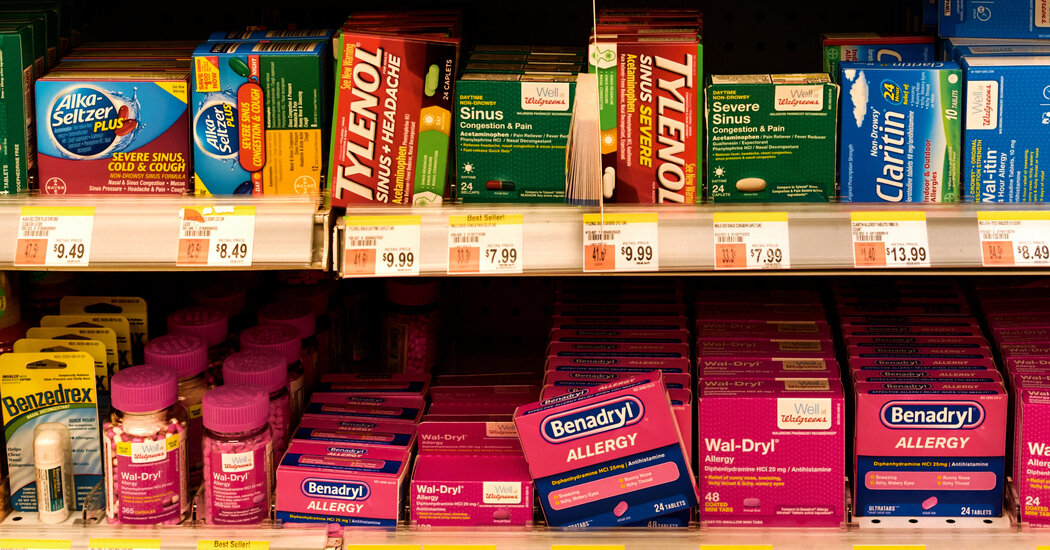news
A Food and Drug Administration advisory panel unanimously agreed Tuesday that common decongestant ingredients used in many over-the-counter cold medicines are ineffective.
The committee’s vote could affect any decision the agency may make on whether to effectively ban phenylephrine, an ingredient that would result in products containing it being removed from store shelves.
If the FDA orders their removal, many popular products including Tylenol, Mucinex and Benadryl cold and flu treatments could become unavailable as companies rush to reformulate them, industry groups warned. .
On Monday and Tuesday, the committee reviewed several existing studies and generally agreed that the studies settled the question that the ingredient was useless and little more than a placebo.
Several advisers pointed out that patients taking the drug were simply delaying their path to useful treatment.
“I think there are clearly better options with over-the-counter medications to help patients, but the research doesn’t support that this is an effective drug,” said committee chair and associate professor of pharmacy. Maria Coyle said. at Ohio State University.
Why it matters: These are popular staples in medicine cabinets.
Millions of Americans reach for these products every cold and flu season, some for decades. The nasal decongestant is included in at least 250 products and had nearly $1.8 billion in sales last year, according to an agency presentation. Products include Sudafed Sinus Congestion, Tylenol Severe Cold and Flu, NyQuil Severe Cold and Flu, Theraflu Severe Cold Relief, and Mucinex Sinus Max.
This ingredient has long been considered safe and effective based on outdated government agency standards, and the FDA still says it is safe.
Many treatments that include phenylephrine also include other, more effective drugs.
And medications that are considered effective for sinus and nasal congestion include nasal sprays containing phenylephrine such as Afrin, oral pseudoephedrine such as Sudafed, or nasal steroids such as Flonase.
Many popular cold and flu products that don’t specifically target congestion do not contain this ingredient.
And it’s still widely considered effective when used for surgery or eye widening. However, scientists have concluded that it is destroyed in the intestines.
If regulators decide that decongestants should be removed from products, there could be significant market disruption if cold medicine makers do not have enough time to replace decongestants from popular products.
Additionally, widespread use of pseudoephedrine, a substitute often used in illegal meth labs and kept behind store counters and in locked cabinets, could return.
Background: Researchers have worked for years to eliminate this component.
This issue has been simmering within the FDA for decades. In 2007, Dr. Leslie Hendeles of the University of Florida and several other pharmacists petitioned authorities to remove the drug from the market.
Dr. Handeles, now a professor emeritus, said in an interview Tuesday that he has been evaluating the ingredient since 1993.
“The bottom line is that quality studies tell the truth about phenylephrine,” he says.
The FDA has now formally concluded that phenylephrine is “not effective as a nasal decongestant” when taken orally.
For consumers, the potential benefits of discontinuing the use of this ingredient include avoiding unnecessary costs and delays in care due to “taking a drug with no benefit,” the agency said. suggested.
The Consumer Healthcare Products Association, which represents companies that make over-the-counter drugs, disagrees. stated in the statement that its ingredients are safe and effective; The group said removing the ingredient would have the “unintended negative consequences” of sending patients to doctors and pharmacists with problems they could have treated themselves, or not receiving treatment at all. Stated.
“Simply put, the burden created by reduced choice and availability of these products is already strained with consumers,” said a statement from Marcia D. Howard, the group’s vice president of regulatory and scientific affairs. “It will be a direct burden to the U.S. health care system.” Office work.
What’s next: It’s up to the FDA to get the ingredients.
It may take some time for changes to be announced.
But authorities have already gone out of their way to declare the ingredient ineffective. But going forward, FDA officials will consider comments and opinions from the panel’s experts before making a final decision.
As is often the case whenever the FDA attempts to take regulatory action that affects the bottom line of a major company, there will likely be efforts to delay the decision, including litigation and lobbying Congress and the White House. . The agency may also give pharmaceutical companies a grace period to replace ingredients in their products, if necessary.

